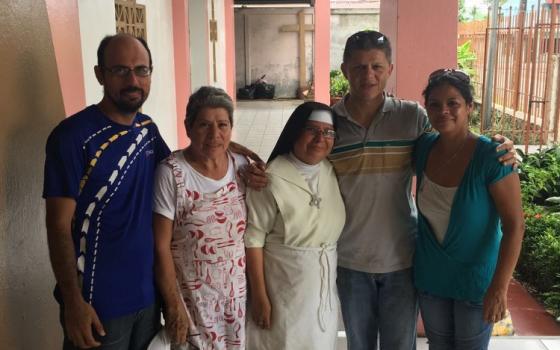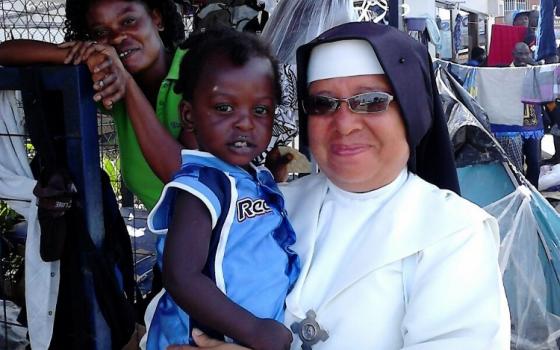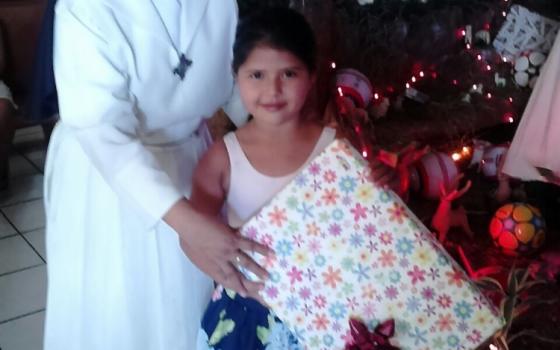Sr. Isabel Cortés is in the midst of a months-long migrant crisis unfolding at a crossing on the 330-kilometer border between Costa Rica and Panama.
Suffering is not new to Cortés, who almost 20 years ago founded a school for adolescents serving jail terms in the Tipitapa prison on the outskirts of Managua, the capital of her native Nicaragua, providing elementary and high school education.
Cortés and a fellow sister of Nicaragua's Congregation of Missionary Servants of Christ the King (Congregación Siervas Misioneras de Cristo Rey) are now based in southern Costa Rica, bringing comfort to hundreds of undocumented migrants who are trapped in a bureaucratic limbo on their way to the United States.
Both sisters work out of the Santa Marta parish in La Cuesta, a Costa Rican town close to the border with Panama, approximately 340 kilometers (211 miles) southwest of San José, the capital of Costa Rica.
A part of the diocese of San Isidro de El General, La Cuesta is in the vicinity of Paso Canoas, the border town where the migrant drama broke out six months ago, first affecting thousands of Cubans and now hundreds of Africans and Asians — men, women, children — anxious to accomplish a common goal of reaching the United States.
Global Sisters Report recently spoke with Cortés about the context of the situation, the challenges she faces, and how she keeps her faith strong.
GSR: Tell me how you became involved with the migrants here.
Cortés: Initially, I had communication at the border [at Paso Canoas] with an International Organization for Migration psychologist, and they started to guide me on what the situation was like. She put me in contact with the organization, and we were having meetings periodically to deal with this population's case of vulnerability.
That's how I got to know a bit more about the migrants' reality, then IOM asked me if, as a congregation, as a church, we could meet some needs — for example, food, shelter or any other situation for us to provide support.
So, since we're a church and we can't deny humanitarian help, I began a mission with some people here in the La Cuesta community, which is where we live. And IOM first sent me seven Cubans who hadn't eaten in four days, had no clothes, had lost everything. So we brought them here, to La Cuesta, and we managed to provide them with what they needed.
In the midst of all you are witnessing now, how do you keep your faith strong?
You're asking me a very powerful question — too powerful, because that touches the deepest fiber, because in the midst of so much pain, we run the risk of losing the sense of faith because we'd think: 'Why does God allow so much pain, so much suffering in his children?'
But in the midst of our faith, what fills us with strength is that God doesn't want suffering for his children. God has drawn up a perfect plan for us all, and that plan has been a project of happiness for his children.
But we as human beings marked by the weakness of sin have changed God's project and have begun to act outside of God's law, outside of God's mandates. If we fulfilled just the mandate Jesus left us — 'love one another' — wow! This world would be heaven on Earth. But we're not willing to live that mandate of love because my selfishness, my pride, my power, my feeling better than others gets in the way or increases in me.
What have you learned in this process?
I've learned in the midst of tests that I have a God of love, and if he gave his son because of love and went through so much suffering, he loves me and loves my brothers. It's not God who's making them suffer. It's us, the brothers, who are vicious with our brothers — Cain and Abel, right? The famous story of Cain and Abel.
So I maintain my faith, and I share it with the brothers in the midst of their pain, and I tell them: 'God doesn't want you to be like this because God loves us. But if you're living this moment of suffering, of pain, take advantage of it, because pain is also fruitful. It doesn't diminish a human being because Christ taught us the value suffering has. It's a redeeming value, it's a value that redeems, that saves.'
In this world, we can find the ability to see suffering not as that which crushes us, but as that which strengthens us.
Do you convey this to the migrants?
That's right, to the migrants and to anyone suffering, because sometimes it's a family, sometimes it's a young person or a child, anyone on the street, the drug addict, the alcoholic.
I have a school in a prison in Nicaragua, and I tell them, 'God doesn't want this for you. God has a different project in your life, and that project is up to you. But if you don't make an effort to change your life also, you're never going to achieve what God wants from you.'
How do you see the Holy Spirit as an influence or as part of the work you do in your ministry?
We know that in the first Pentecost, those men were afraid to go out and speak of Christ and didn't have yet the strength, the courage. Then the Holy Spirit arrived and began speaking about the mission Christ brought, about the salvation we received, the announcement that Christ had suffered, had died, but had resurrected also and was alive in our midst. In our mission, we make Jesus be alive among the brothers.
[George Rodriguez is a freelance correspondent based in Costa Rica.]
Related - Sisters help migrants caught in legal limbo in Costa Rica



